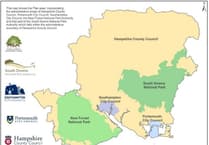PLANS for improving health and care services across Hampshire are the bedrock of a programme to ensure they remain sustainable in the future.
If NHS groups across the county do nothing to change the rising demand for services and the way they are provided, by 2020/21 a gap of £577m between the money received and what they will cost to provide has been forecast.
That gap does not take account of challenges facing social care.
Hampshire is one of 44 areas across England developing detailed local transformation and sustainability plans to find ways of solving these problems.
An NHS England spokesman said the plans had been developed after years of discussion about how to achieve the changes people and clinicians have said they want locally.
He said:?“As a result of the plans, patients in Hampshire will benefit from more health and care services being provided closer to, or in their homes, over the next five years. They will have more choice about when and where to receive treatment, less travelling time to attend appointments and less time waiting for appointments, diagnostic tests and test results – plus more opportun- ities to be cared for at home and in the community, rather than in hospital.
The programme, which has been developed by all the area’s health and care organisations, also describes how the NHS will implement a number of critical national programmes locally, including the Five Year Forward View (FYFV) for mental health and GP services.
According to NHS England, the plan does not replace or slow down local transformation programmes.
Instead, the NHS and its support services will work in partnership. Acute hospital NHS Trusts are building an alliance to improve outcomes for all patients in future while managing within available finances. Working together also allows the local health and care system to better share best practice and to ensure co-ordination when local changes are made.
The plan covers 2016-21 and, while some changes can be made quickly, others will take longer to develop and require substantial – and, where appropriate – formal consultation with the population before they can be implemented.
That includes future provision of acute services in north and mid-Hampshire.
Over the next weeks, each statutory organisation involved will receive the plan for discussion at their public board meetings. The plan will also be discussed at health and well-being board meetings in Hampshire.
Over the coming months, NHS organisations will open up discussions predominately with existing intersted parites across Hampshire.
If, after this period, any proposal emerges considered to represent a significant change in service, there will also be a full consultation with citizens and stakeholder groups. The report claims the NHS has dramatically improved over the past 15 years – cancer and cardiac outcomes are better, plus waits are shorter and patient satisfaction is higher.
Even during the last recession progress has continued thanks to protected funding and NHS staff commitment.
The report acknowledges the NHS faces particular challenges in areas such as mental health, cancer and support for frail older patients, with pressures building. The FYFV sets out clear direction for the NHS, some of which can be brought about by the NHS itself with other actions in need of new partnerships with local communities, authorities and employers. Some important decisions about money, on various public health measures and local service charges will need firm support from the government.
To make sure the NHS can keep working into the future “prevention” is needed, which includes hard-hitting national action on obesity, smoking, alcohol and other major health risks, by helping to develop and support new ideas in the workplace to help employees’ health and cut sickness-related unemployment.
The FYFV advocates stronger public health related powers for local government and elected mayors, for patients to gain greater control of their own care and more support for the 1.4million full-time unpaid carers in England. The NHS aims to take steps to break down the barriers in how care is provided between family doctors, hospitals, as well as physical and mental health, health and social care, with more care delivered locally in specialist centres.
One new option will be to let groups of GPs join with nurses, other community health services, hospital specialists as well as mental health and social care to create integrated out-of-hospital care through the ‘multispeciality community provider’.
A further option is the joined hospital and primary care provider – entitled ‘primary and acute care systems’, bringing together GP and hospital services for the first time. Across the NHS, urgent and emergency care services will be redesigned to join up A&E departments, GP out-of-hours services, urgent care centres, NHS 111 and ambulance services.
Smaller hospitals – such as Haslemere Hospital – will have new options to help them stay workable, including making partnerships with other hospitals further away, midwives will have options to take charge of the maternity services they offer, the NHS will provide more support for frail older people living in care homes but the basis of NHS care will remain as primary care and GPs will need new kinds of support for the extra work they will be doing.
Over the next five years the NHS will put more money into primary care and keep the amount of money the same to fund General Practice nationally over the next two years, while GP-led Clinical Commissioning Groups (CCGs) will have the option of more control over the wider NHS budget.
The NHS plans to improve the way money is used so it can meet demands over the next 10 years. Monitor NHS England and independent analysts believes there will be a £30billion a year gap between resources and patient needs by 2020/1.
Action will be needed on three fronts – demand, efficiency and funding.
Visit ww.england.nhs.uk




Comments
This article has no comments yet. Be the first to leave a comment.